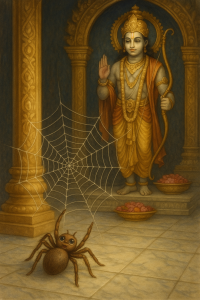A Holy Site of Final Rites
In a quiet village near a sacred confluence of rivers, devotees would regularly bring the bodies of departed Vaiṣṇavas to perform final rites and cremation ceremonies. The banks of this river were sanctified by the chanting of holy names, the presence of brāhmaṇas, and the remnants of sacred paraphernalia used in pūjā.
This land had become hallowed by the ashes of devotees, whose lives had been spent in the service of the Lord.
The Vulture’s Unexpected Role
One day, after the cremation of a great devotee, the family of the deceased gathered the ashes and bones to be immersed in the river. As they placed them on the bank, a large vulture swooped down and, mistaking the small bone fragments for food, flew off with them in its beak.
The family cried out in distress, but the bird was already gone—gliding into the sky with its unexpected burden.
A Divine Transformation
Later that night, the priest who had conducted the funeral rites had a vision. In it, Viṣṇudūtas appeared, guiding the vulture’s soul upwards toward the sky in a chariot of light. When he inquired about this, the celestial messengers replied:
“This vulture, though ignorant, has carried the sacred remnants of a pure devotee of the Lord. Such bones, burned in the fire of sacrifice and saturated with bhakti, are spiritually powerful. By touching them and flying with them, the vulture has unknowingly rendered service. Therefore, he has been liberated from his lower birth and brought to Vaikuṇṭha.”
The priest woke in awe, realizing the immense power of contact with devotees and their remnants.
Lessons to Be Learned:
- Even unconscious contact with the remnants of a devotee is purifying and can elevate the soul.
- The ashes and bones of a pure Vaiṣṇava are not ordinary—they are infused with devotion and carry the presence of the Lord.
- The Lord honors any being, regardless of species, who comes in contact with that which has been used in His service.
- As the scriptures proclaim: “tulasī-dala-mātreṇa jalasya culukena vā / vikrīṇīte svam ātmānaṁ bhaktebhyo bhakta-vatsalaḥ”
“The Lord, who is affectionate to His devotees, sells Himself for even a tulasī leaf or a drop of water offered in devotion.” (Padma Purāṇa)
Origin of the Story: Padma Purāṇa – Stories section glorifying the sanctity of the bodies and remains of devotees, and how even animals may attain liberation through contact with such holy remnants.

